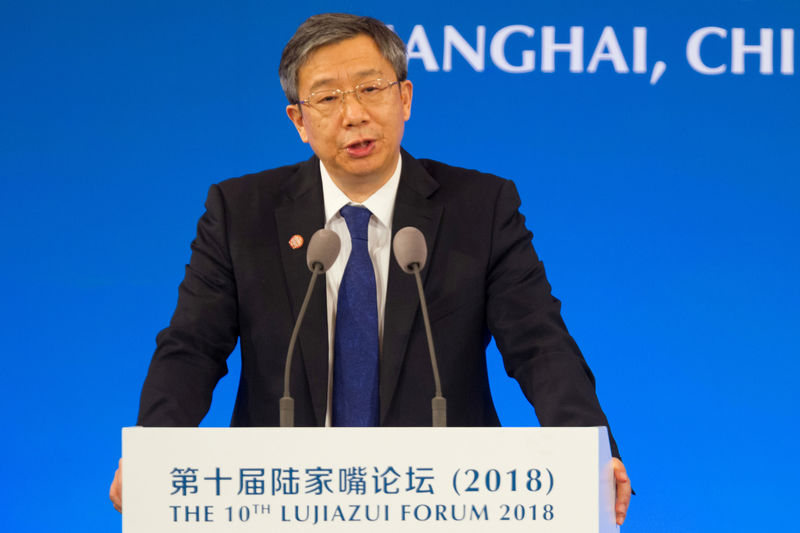 © Reuters. People’s Bank of China (PBOC) Governor Yi Gang speaks at the Lujiazui financial forum in Shanghai
© Reuters. People’s Bank of China (PBOC) Governor Yi Gang speaks at the Lujiazui financial forum in ShanghaiBEIJING (Reuters) – China’s central bank will ratchet up support for the economy by improving its policy transmission mechanism, governor Yi Gang said in remarks published on Wednesday.
Policymakers have pledged to step up support this year, following a raft of measures in 2018 including fast tracking infrastructure projects and cuts in banks’ reserve requirements and taxes, amid a trade dispute with the United States.
Data later this month is expected to show China growth slowed to around 6.6 percent in 2018 from 6.9 percent the previous year. Analysts are forecasting a further loss of momentum in coming months before policy support measures begin to kick in.
“The financial support for the real economy has not weakened as economic growth slows. Instead, the support has increased to reflect counter-cyclical adjustments,” the official Xinhua news agency quoted Yi as saying.
The People’s Bank of China said on Friday it was cutting the amount of cash that banks have to hold as reserves for the fifth time in a year, freeing up $116 billion for new lending as it tries to reduce the risk of a sharp economic slowdown.
The first targeted medium-term lending facility (TMLF) operation will come into operation this month, Yi said.
In December, the central bank rolled out the TMLF to spur lending to small and private firms to support slowing economic growth.
“These measures will help keep liquidity reasonably ample, keep interest rates steady and guide reasonable growth of money and credit,” Yi said.
The central bank needs to further improve its monetary policy transmission mechanism from both supply and demand sides, given that financing demand has declined as the economy slows while banks’ risk appetite has also fallen, Yi said.
“The key to improving monetary policy transmission mechanism is to establish an incentive mechanism for banks and actively increase support for the real economy,” Yi said.
The central bank has recently modified the wording on monetary policy to “prudent with appropriate looseness and tightness” from “prudent and neutral”.
China will stick to its structural deleveraging as financial risks exposed earlier have been dealt with in an orderly way, Yi said.
China’s financial risks are generally under control while its macro-leverage ratio is basically steady, he said.
Still, regulators will prevent various “black swan incidents”, or unforeseen events, and maintain stability in the country’s stock market, bond market and foreign exchange markets, he said.
Fusion Media or anyone involved with Fusion Media will not accept any liability for loss or damage as a result of reliance on the information including data, quotes, charts and buy/sell signals contained within this website. Please be fully informed regarding the risks and costs associated with trading the financial markets, it is one of the riskiest investment forms possible.
Source: Investing.com




























